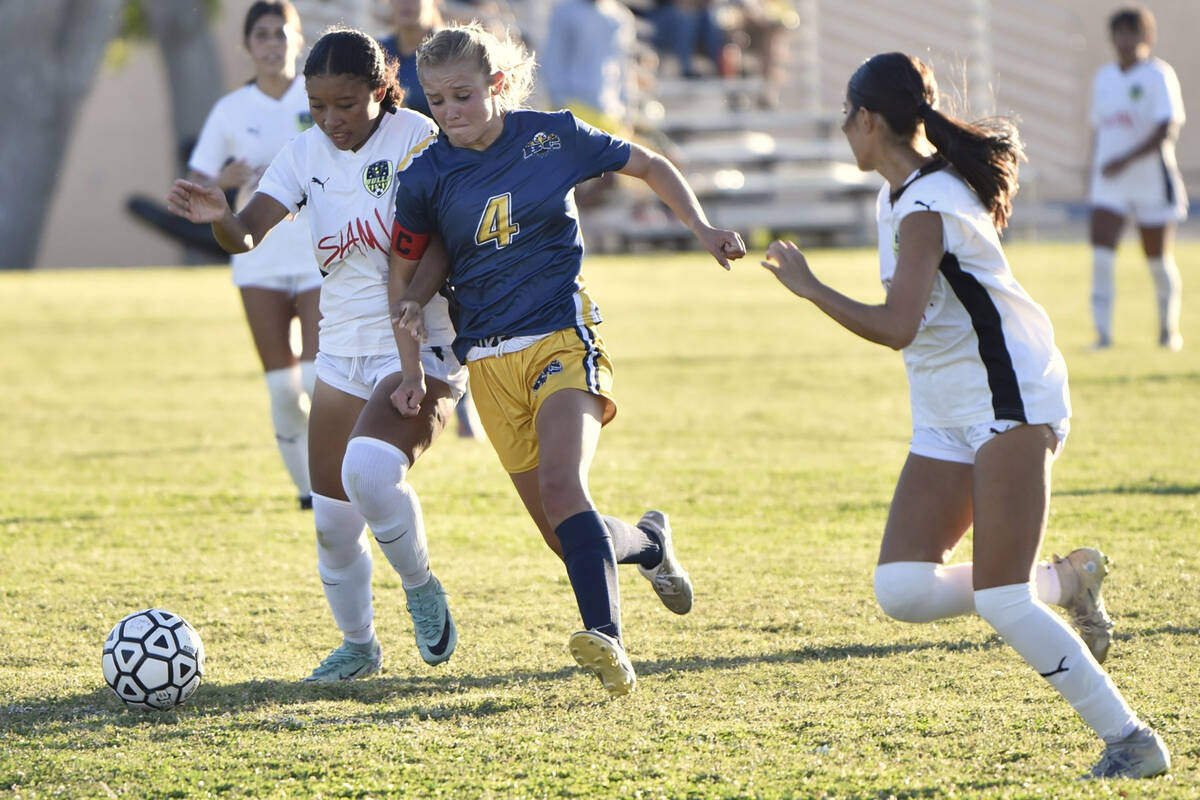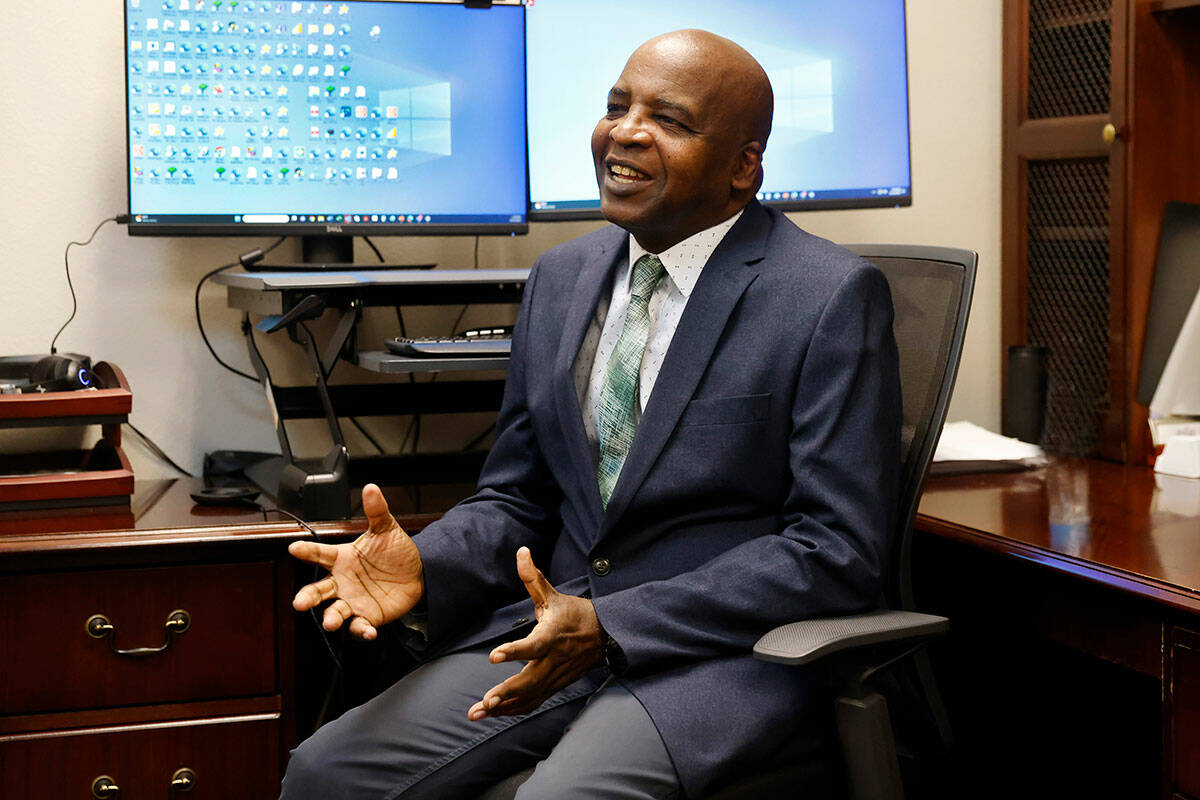Nevada
COVID-19 insurance coverage lawsuit pending in Nevada Supreme Court could be a game-changer

LAS VEGAS (KTNV) — Some Nevada business owners eagerly await a Nevada Supreme Court ruling about COVID-19 insurance coverage. The decision could set precedent on whether insurance companies need to reimburse businesses for pandemic-related losses.
The owner of Las Vegas Strip open air mall Grand Bazaar Shops, JGB Retail, sued its insurance company, Starr Surplus Lines Insurance Company, in 2020. The case is now in the hands of Nevada’s high court justices.
JGB claimed the virus caused property loss, but the insurer argued airborne viruses didn’t physically alter the shops.
UNLV law professor Jeffrey Stempel said the case could come down to policy language. According to Stempel, insurers started using “virus exclusion” clauses more often in policies after SARS outbreaks in 2003. But this specific clause wasn’t in JGB’s policy with Starr.
“In this case, I think the argument of no physical loss or damage is very weak on the part of the insurers, particularly since they didn’t define the term in the policy,” said Stempel. “Since the drafting history of the virus exclusion suggests that without a draft virus exclusion, there would be coverage for this type of event.”
JGB’s policy did, however, have a pollution and contamination exclusion clause — which Starr’s attorney, Dan Polsenberg, said includes viruses.
“It excludes smoke, fumes, viruses and hazardous materials,” said Polsenberg. “So actually, the insured lose two ways. Number one, it’s not covered in the first place, because it’s not property damage. Number two, it’s excluded because it’s a virus.”
Stempel believes the pollution and contamination exclusion also excluding infectious diseases like COVID could be a stretch.
“If you look at the drafting history of the pollution exclusion, it’s pretty clear that what the insurers didn’t want to cover was smokestack pollution, groundwater pollution, stuff being dumped into the river, escaping fumes that spread throughout the neighborhood,” said Stempel. “And so when they add virus to pollution, they must have been concerned about virus in, say, contaminated water or smog or discharged from a plant.”
John Ellison is an attorney and the president of United Policyholders, a nonprofit in support of policyholders.
United Policyholders filed an amicus brief in support of JGB Retail. Ellison said JGB should be compensated based on the fact that the virus caused business interruption.
“The presence of COVID caused them to lose their ability to conduct their business the way they had before the pandemic started,” said Ellison. “Now, the insurance companies say that’s not physical loss or damage because the CVOID doesn’t change the structure of the building or it doesn’t cause the roof to fall down. Our view is that that’s not required. That might be physical damage, but physical loss is something else.”
According to the University of Pennsylvania’s COVID coverage litigation tracker, there have been thousands of similar lawsuits nationwide. Many are currently pending decisions. But most ruled so far have sided with insurance companies.
“The insurers that won on the no physical loss or damage argument also had virus exclusions,” said Stempel.
Stempel believes even if a judge rules in favor of JGB in this particular case, because the policy didn’t explicitly have “virus exclusion,” some cases will continue to favor insurance companies.
“For the insurers that did put a virus exclusion in their policy, they’re still likely to keep winning even if JGB wins this case,” Stempel said.
The Nevada Supreme Court heard oral arguments from both sides on Monday. It’s unclear when the high court will hand down a ruling.
The American Property Casualty Insurance Association filed an amicus brief in support of Starr Surplus Lines.
In a statement to Channel 13, assistant Vice President Ken Stoller said the following:
“Judicial decisions or legislative enactments to mandate retroactive business interruption coverage to include COVID-19 losses not in contracts would undermine the stability of the insurance industry and its ability to pay claims on all existing insurance policies. Business interruption insurance is part of property insurance policies that cover actual physical loss of or damage to covered property. Actual physical loss is the total destruction of covered property by fire or tornado or the loss of covered property due to theft, for example. Damage to covered property is the partial alteration of the structural integrity of covered property by fire or tornado, for example. These policies are not intended to cover diseases or pandemic related losses. In the vast majority of cases, insurers did not price policies to include such coverage, and policyholders did not pay for it.
Pandemic-related claims have now been rejected by every federal circuit court except the D.C. Circuit, whose only pending case has now settled; by state high courts in Connecticut, the District of Columbia, Iowa, Louisiana, Maryland, Massachusetts, New Hampshire, Ohio, Oklahoma, South Carolina, Washington, and Wisconsin; by intermediate appellate courts in several other states (some of whose supreme courts have declined to review those decisions); and by the overwhelming majority of state and federal trial courts. The few outlier decisions have been on non-dispositive procedural grounds and driven by very lenient pleading standards, or have adopted coverage theories that have been repeatedly and soundly rejected elsewhere.”

Nevada
Nelson paces All-Southern Nevada soccer selections

Honored among the state’s best, Boulder City High School girls soccer stars Makayla Nelson and Abbey Byington were named to the All-Southern Nevada team.
An honor usually presented to 5A and 4A players, Nelson and Byington were among seven 3A players to make the 54-player team.
“I am very proud of Mack and Abbey’s accomplishments this year,” head coach Kristin Shelton said. “I’m not surprised they were honored as top players in the state, as they absolutely deserve it. Their talent is obvious and I’m so happy it was recognized by others.”
A dynamic scorer with a state-leading 58 goals, Nelson was named a second-team All-Southern Nevada selection after being named 3A Mountain league’s most valuable player.
Helping the Lady Eagles to a 15-4-1 record, Nelson was named to the 3A All-State first team, after generating 15 assists as well this past season.
“I can’t say it enough that Mack was a force to be reckoned with this year,” Shelton said. “Not only was she our leading scorer, she was just an all-around great student-athlete and leader. Every other coach in our league knew her by name and agreed that she was most deserving of Player of the Year.”
Named an honorable mention selection, Byington was named to the 3A Southern region second team after generating 30 goals and 16 assists this past season.
Honored by the 3A, junior Sancha Jenas-Keogh was a first-team 3A All-State selection after being named defensive player of the year for the Southern region.
Emerging as a breakout presence on both sides of the ball, Jenas-Keogh generated eight goals and eight assists, along with 20 steals.
“Sancha blew everyone away defensively this year,” Shelton said. “Her speed is unmatched, which is why she was able to shut down so many top players in our league. I am extremely excited to have her for one more season and really look forward to continue watching her soccer success.”
Named to the Mountain League second team for the Eagles was senior Abby Francis (eight goals, 12 assists) and juniors Josie Cimino (six goals, seven assists) and Leonesse Williams (six assists, 48 steals).
Nevada
Top 5 high school mascots in Nevada: Vote for the best

Some of the best high school mascots in Nevada are in some seriously remote locations, but one urban contender for best in the state is Cheyenne High School’s Desert Shields in North Las Vegas.
Over the next couple of months, SBLive/SI will be featuring the best high school mascots in every state, giving readers a chance to vote for No. 1 in all 50.
The winners and highest vote-getters will make up the field for our NCAA Tournament-style March Mascot Madness bracket in 2025. The Coalinga Horned Toads (California) are the defending national champions.
Here are High School on SI’s top 5 high school mascots in Nevada (vote in the poll below to pick your favorite):
The poll will close at 11:59 p.m. ET Thursday, Jan. 9.
The North Las Vegas school was built in 1991, a year after the United States’ Operation Desert Shield began in Iraq. For Native Americans, a desert shield is a protective hide often decorated with bright designs and feathers.
Not quite a tornado, a dust devil is a strong, well-formed, relatively short-lived whirlwind. And the Dust Devils’ mascot has lots more personality than a lot of tornado logos out there — it looks ready to fight with its dukes up while sporting a serpent-like tail.
Tonopah is in mining country in off-the-beaten-path Nevada, and mucking is a little-known mining process. Muck is a mix of silver, rock and dirt, and muckers load it into ore cars for it to be rolled to the surface and processed. Fighting Muckers, on the other hand, play high school sports.
Mineral County residents have been telling horror stories about Walker Lake’s Cecil the Serpent since the 1800s, warning of imminent death to anyone who dared to swim in Cecil’s lake. If that’s not a perfect scenario for a high school mascot, I don’t know what is.
Anyone with arachnophobia will want to skip ahead to the next one (and stay away from Gabbs, Nevada, in the fall). From September through November, thousands of desert tarantulas get out of their burrows and roam searching for a mate, representing the world’s largest tarantula migration. They’re so ever-present in Gabbs that the high school made the obvious choice of calling themselves the Tarantulas.
—
To get live updates on your phone — as well as follow your favorite teams and top games — you can download the SBLive Sports app: Download iPhone App | Download Android App
— Mike Swanson | swanson@scorebooklive.com | @sblivesports
Nevada
‘Tremendous contributions:’ Southern Nevada’s top health official is retiring

Dr. Fermin Leguen’s family had expected him to become physician since he was a child growing up in Cuba.
He initially thought that he might study aviation technology. He wanted travel the world.
“Honestly, medicine wasn’t one of my top things to do,” he said in a recent interview. “But at the same time — like every other kid — you really have no idea about what any career is about.”
Leguen, 71, eventually made a choice he said he’s never regretted.
“Finally, I decided to go with medicine,” Leguen said.
Southern Nevada’s Health District top official is retiring at the beginning of March, marking an end to a decades-long career that dispatched him across the globe to serve in public health.
“I have never (spent) a long period of time doing nothing, so I don’t know what to expect,” he said about his upcoming retirement.
Leguen — who became the face of the valley’s COVID-19 response as acting chief health officer— said he will miss his team and their dedication.
He will simply miss “just being here.”
Leguen said he believes the Health District will remain in good hands, supported with a “very strong team.”
“We have very professional people here with a lot of skills, highly trained,” he said. “Regardless of who’s leading the organization, the biggest strength we have is the people we have here. And they are fully capable of responding to multiple public-health threats that we could face.”
The Health District board appointed Dr. Cassius Lockett — deputy district health officer — to succeed Leguen.
‘Tremendous contributions’
Leguen, who speaks softly and has a shy demeanor, was honored at Las Vegas City Hall earlier this month.
Shortly after the room cleared from the festivities that welcomed new Mayor Shelley Berkley and Councilwoman Shondra Summers-Armstrong, Councilwoman Olivia Diaz took the microphone to issue a proclamation honoring Leguen for his “tremendous contributions.”
“Dr. Leguen, gracias,” Diaz said. “I just want to say ‘thank you’ for everything that you have done.”
Leguen joined the health district in 2016 as director of clinical services. In October 2019 — a few months before the global pandemic broke out, he was named acting chief health officer.
“Little did we know when we selected him… what we were going to be reeling and dealing with as the world and as a community,” Diaz said. “I don’t think this man would get a shut eye.”
As the health district searched for a permanent agency head, “the board leadership just decided Dr. Leguen has already proven himself as the right leader for this agency.”
Leguen was officially promoted in early 2021.
During his tenure, he spearheaded the opening of two community health hubs that offer immunizations and primary health services for patients with no health insurance, Diaz noted.
He said he’s proud of his administration’s program that helps address a congenital syphilis crisis that’s “devastating” children.
During the pandemic, Leguen led the rollout of a bilingual education campaign for Spanish speakers at a time when Latinos accounted for 25 percent of COVID-19 deaths, Diaz said.
When Clark County commissioners faced backlash in the fall of 2021 over a resolution declaring vaccine misinformation a source of increased demand for unsafe treatments, Leguen supported the motion.
“While it is essential for public agencies to provide a forum for people to comment and give input on issues that impact them, it is critical that information impacting the health and safety of the public be based on proven science and accurate data,” he said at the time.
“He’s made it a priority for the Southern Nevada Health District to reflect the community it serves,” Diaz said. “And to forge partnerships with diverse community organizations in order to better reach and serve underserved residents.”
Diaz said Leguen headed the region’s response to other public health emergencies, such as the opioid epidemic and the West Nile virus.
“I wish COVID was the only one,” Diaz said.
A life of service
Leguen was born in Guantanamo, Cuba. His parents moved the family to the capital city of Havana when he was a toddler.
He studied medicine at the University of Havana.
Leguen worked for Cuba’s social services. He fled the communist country in 1991, eventually migrating to the U.S. where he began a residency in Puerto Rico before completing a pediatric residency at Johns Hopkins Hospital.
Throughout his career, he was a vaccination consultant in Africa, Caribbean countries and South America.
He credits vaccinations for saving lives during the pandemic.
“When you’re seeing the number of deaths increasing day by day and there is nothing telling you that this is going to get better, it’s very, very depressing,” he said.
While nobody can fully prepare for a future pandemic, Leguen said that the agency has learned lessons to hamper the impact. Community in Southern Nevada collaboration was crucial, he added.
“We must be ready to learn every single day,” he said. “Nobody has the 100 percent answer for anything. We must be willing to communicate with our peers and the public our concerns, our limitations. And also make sure our community is aware of the multiple threats that could be there.”
Leguen, who has a wife and a daughter, said he’s looking forward to having more time to read fiction and watch Korean movies.
Asked to reflect about being an immigrant of color in the U.S. with a life of service under his sleeve, Leguen spoke generally about living out a dream.
“What I would say to anybody is that you have to follow your dreams,” he said. “You must be consistent with your beliefs. You must be able to sacrifice yourselves and be confident.”
Contact Ricardo Torres-Cortez at rtorres@reviewjournal.com.
-
/cdn.vox-cdn.com/uploads/chorus_asset/file/24924653/236780_Google_AntiTrust_Trial_Custom_Art_CVirginia__0003_1.png)
/cdn.vox-cdn.com/uploads/chorus_asset/file/24924653/236780_Google_AntiTrust_Trial_Custom_Art_CVirginia__0003_1.png) Technology6 days ago
Technology6 days agoGoogle’s counteroffer to the government trying to break it up is unbundling Android apps
-

 News7 days ago
News7 days agoNovo Nordisk shares tumble as weight-loss drug trial data disappoints
-

 Politics7 days ago
Politics7 days agoIllegal immigrant sexually abused child in the U.S. after being removed from the country five times
-

 Entertainment1 week ago
Entertainment1 week ago'It's a little holiday gift': Inside the Weeknd's free Santa Monica show for his biggest fans
-

 Lifestyle1 week ago
Lifestyle1 week agoThink you can't dance? Get up and try these tips in our comic. We dare you!
-
/cdn.vox-cdn.com/uploads/chorus_asset/file/25672934/Metaphor_Key_Art_Horizontal.png)
/cdn.vox-cdn.com/uploads/chorus_asset/file/25672934/Metaphor_Key_Art_Horizontal.png) Technology2 days ago
Technology2 days agoThere’s a reason Metaphor: ReFantanzio’s battle music sounds as cool as it does
-

 Technology1 week ago
Technology1 week agoFox News AI Newsletter: OpenAI responds to Elon Musk's lawsuit
-

 News3 days ago
News3 days agoFrance’s new premier selects Eric Lombard as finance minister


















